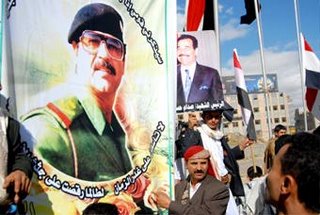
How Bush and Blair's choices have led to disaster in Iraq, culminating in a chaotic execution that is fuelling civil war
By Patrick Cockburn
The Independent
".......There is also a fear among Shia leaders that the US might suddenly change sides. This is not as outlandish as it might at first appear. The US has been cultivating the Sunni in Iraq for the past 18 months. It has sought talks with the insurgents. It has tried to reverse the de-Baathification campaign. US commentators and politicians blithely talk about eliminating the anti-American Shia cleric Muqtada al-Sadr and fighting his militia, the Mehdi Army. No wonder Shias feel that it is better to get Saddam under the ground just as quickly as possible. Americans may have forgotten that they were once allied to him but Iraqis have not.
When Saddam fell Iraqis expected life to get better. They hoped to live like Saudis and Kuwaitis. They knew he had ruined his country by hot and cold wars. When he came to power as president in 1979, Iraq had large oil revenues, vast oil reserves, a well-educated people and a competent administration. By invading Iran in 1980 and Kuwait in 1990, he reduced his nation to poverty. This was made worse by the economic siege imposed by 13 years of UN sanctions.
But life did not get better after 2003. Face-to-face interviews with 2,000 Iraqi adults by the Iraq Centre for Research and Strategic Studies in November revealed that 90 per cent of them said the situation in their country had been better before the US-led invasion. Only 5 per cent of people said it was better today. The survey was carried out in Baghdad, in the wholly Sunni Anbar province and the entirely Shia Najaf province. It does not include the Kurds, who remain favourable to the occupation.
This does not mean that Iraqis want Saddam back. But it is clearly true that the chances of dying violently in Iraq are far greater today everywhere in the country outside the three Kurdish provinces than they were in 2002. The myth put about by Republican neoconservatives that large parts of Iraq enjoyed pastoral calm post-war but were ignored by the liberal media was always a fiction. None of the neocons who claim that the good news from Iraq was being suppressed ever made any effort to visit those Iraqi provinces which they claimed were at peace.
Saddam should not have been a hard act to follow. It was not inevitable that the country should revert to Hobbesian anarchy. At first the US and Britain did not care what Iraqis thought. Their victory over the Iraqi army - and earlier over the Taliban in Afghanistan - had been too easy. They installed a semi-colonial regime. By the time they realised that the guerrilla war was serious it was too late.
It could get worse yet. The so-called "surge" in US troop levels by 20,000 to 30,000 men on top of the 145,000 soldiers already in the country is unlikely to produce many dividends. It seems primarily designed so that President George Bush does not have to admit defeat or take hard choices about talking to Iran and Syria. But these reinforcements might tempt the US to assault the Mehdi Army.
Somehow many senior US officials have convinced themselves that it is Mr Sadr, revered by millions of Shia, who is the obstacle to a moderate Iraqi government. In fact his legitimacy in the eyes of ordinary Shia Iraqis, the great majority of the population, is far greater than the "moderate" politicians whom the US has in its pocket and who seldom venture out of the Green Zone. Mr Sadr is a supporter of Mr Maliki, whose relations with Washington are ambivalent.
An attack on the Shia militia men of the Mehdi Army could finally lead to the collapse of Iraq into total anarchy. Saddam must already be laughing in his grave."

No comments:
Post a Comment